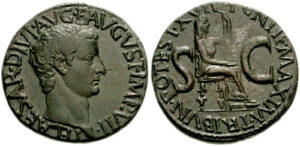
Image taken from http://www.ancient-roman-coin.com/tiberius-coins-imperial. The front reads, “Tiberius, Caesar Augustus, Son of the Divine Augustus;” the back reads, “Highest Priest, Power of the People.”
“The haughty looks of man shall be brought low, and the lofty pride of men shall be humbled, and the Lord alone will be exalted in that day” (Isaiah 2:11).
The infancy narratives of Matthew and Luke do a lot of cosmic re-arranging. We’re probably not accustomed to noticing that. For example, in the Annunciation to Zechariah (Luke 1:8-23), the angel Gabriel foretells that John the Baptist will “turn many of the children of Israel to the Lord their God, and he will go before him in the spirit and power of Elijah, to turn the hearts of the fathers to the children, and the disobedient to the wisdom of the just, to make ready for the Lord a people prepared” (Luke 1:16-17). Later, in Zechariah’s prophecy, he refers back to this as preparing the Lord’s “ways” (Luke 1:77). The ministry of John the Baptist (known as “the Forerunner”) was to arrange Israel’s world around the coming of the Lord.
Another cosmic re-arrangement is reflected in Mary’s song of response to Elizabeth’s benediction (traditionally called the “Magnificat” from the Latin magnifico, meaning “I magnify;” as in the Latin Vulgate’s translation of Luke 1:46, “my soul magnifies the Lord”). Mary declares, “He has shown strength with his arm; he has scattered the proud in the thoughts of their hearts; he has brought down the mighty from their thrones and exalted those of humble estate; he has filled the hungry with good things, and the rich he has sent away empty” (Luke 1:51-53). As Mary sings, the coming of the Lord disperses the proud from their self-centered assurances, dislocates the powerful from their levers of influence, and dismisses the rich from the distribution of God’s own goods. Much like the psalmist writes, “You rebuke the insolent, accursed ones, who wander from your commandments” (Psalm 119:21). Or again, “In the way of your testimonies I delight as much as in all riches” (Psalm 119:14). Or once more, “Even though princes sit plotting against me, your servant will meditate on your statutes. Your testimonies are my delight; they are my counselors” (Psalm 119:23-24).
Pride, power, and money should concern us. Like children playing a game (or perhaps more trivially), we dedicate our whole lives to projects that will die. Some will die with us. Some will die long after. But they’ll all die. Someday, you will die, your bank account will either empty or transfer, people will forget about you or know you in a way that amounts to as much, and what will be left of your pursuits?
In Luke’s Gospel, Jesus is asked whether the Jews ought to “give tribute to Caesar, or not” (Luke 20:22). After asking to see a denarius (the silver coin pictured above), referring them to the visage and inscription upon it, he famously replied, “Render to Caesar the things that are Caesar’s and to God the things that are God’s” (Luke 20:25). Denarii were frequently minted with inscriptions that spoke to the divinity and stature of the emperor. In the time of Jesus’ ministry, the current emperor was Tiberius. The image above illustrates Tiberius’ claim to divinity through his father Augustus, inscribed on a denarius. (A name in a history book who thought he was a god!) Like Tiberius’ denarius, which only held power over his subjects insofar as they lived in his world, our own money only holds power over us insofar as we live in its world. However, we are God’s and God beckons us to live in his world (Genesis 1:26-31; 1 Timothy 6:17-18).
Today, I suspect it would benefit each of us to ask: what is my money for? And again, what am I for? Of my efforts, my regards, what will be left when time has its fill? The birth of Jesus determines the proper place of our finances, his coming provides our way to projects, although not our own, the worth of which death cannot decay. Paul writes to the Church of Thessaloniki, “For what is our hope or joy or crown of boasting before our Lord Jesus at his coming? Is it not you? For you are our glory and joy” (1 Thessalonians 2:20).
Further Reading: Psalm 119:1-24; Isaiah 2:1-11; 1 Thessalonians 2:13-20; Luke 20:19-26
Written by Guest House Theologian, Tim Morgan. These reflections are a complimentary addition to our Advent Blend Coffee Bags. Scan the QR code each day to read the most recent reflection.

More Advent reflections can be found here.